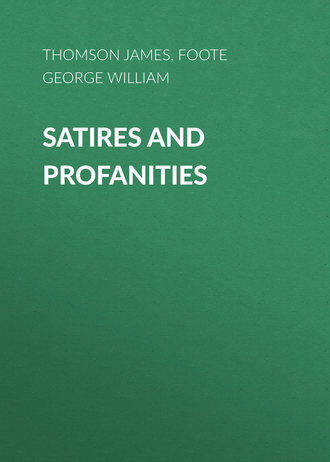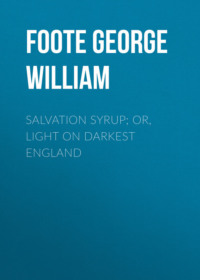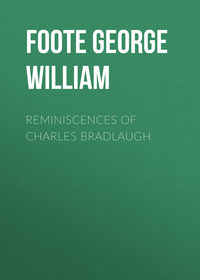 полная версия
полная версияSatires and Profanities

G. W. Foote
Satires and Profanities
PREFACE
Believing as I do that James Thomson is, since Shelley, the most brilliant genius who has wielded a pen in the service of Freethought, I take a natural pride and pleasure in rescuing the following articles from burial in the great mausoleum of the periodical press. There will doubtless be a diversity of opinion as to their value. One critic, for instance, has called “The Story of a Famous Old Jewish Firm” a witless squib; but, on the other hand, the late Professor Clifford considered it a piece of exquisite mordant satire worthy of Swift. Such differences are inevitable from the very nature of the subject. Satire, more than any other form of composition, rouses antipathy where it does not command applause; and the greater the satire, the more intense are the feelings it excites.
But which side, it may be inquired, is likely to be the best judge? Surely the friendly one. Sympathy is requisite to insight, as Carlyle says; while hostility blinds us to a thousand virtues and beauties. I am aware that many will take objection to the employment of satire at all, whether good or bad, on religious topics; but this seems to me preposterous, and I should readily answer it, if Thomson had not done so himself in the most vigorous and triumphant manner.
Nearly all the pieces in this volume appeared originally in the National Reformer or the Secularist. I have attempted no arrangement of them, not even a chronological one; the compositor has shuffled them at his own sweet will. All I have done, besides collecting them and carefully reading the proofs, is to indicate in each case the year of first publication; and I think the reader will approve this plan as both modest and sensible.
I am much mistaken if this volume does not become a well-prized treasure to many Freethinkers; that it will ever be valued by the general public I dare not hope. Yet the number of its admirers will increase with the growth of a healthy scepticism. It will not fall like a bombshell among ordinary readers, who serenely ignore the most terrible mental explosives, and render them comparatively innocuous by mere force of neglect; but it will startle and stimulate some minds, and in time its influence will extend to many more.
What value Thomson placed on these pieces it is difficult to decide. “Working off the talent,” he once remarked when I mentioned them. But the fact remains that he allowed one or two of them to be reprinted as pamphlets before any of his poems were collected in a volume. He naturally cared more for his poems than for his prose. What poet ever did the contrary? But even for these he cared little, except “The City of Dreadful Night” and a few others, which expressed his profoundest convictions.
There were several articles in his “Essays and Phantasies” that proved Thomson to be a born satirist as well as a born poet; notably “Proposals for the Speedy Extinction of Evil and Misery,” a tremendous display of sustained irony, to my mind unsurpassed even by Swift at his greatest, and with a poetic grandeur quite beyond him. The contents of this volume show marks of the same strong hand. There is never, perhaps, so continuous an exertion of power; but there is more versatility, more freedom, and often more abandon. I fancy, too, there is more rapidity and suppleness, and I am sure there is more mirth.
Thomson’s satire was always bitterest, or at any rate most trenchant, when it dealt with Religion, which he considered a disease of the mind, engendered by folly and fostered by ignorance and vanity. He saw that spiritual superstition not only diverts men from Truth, but induces a slavish stupidity of mind, and prepares the way for every form of political and social injustice. He was an Atheist first and a Republican afterwards. He derided the idea of making a true Republic of a population besotted with religion, paralysed by creeds cringing to the agents of their servitude, and clinging to the chains that enthral them.
A few words only as to Thomson’s life. Outwardly it was singularly uneventful, although inwardly it was intense and exciting. He was bom at Port Glasgow, on the 23rd of November, 1834; and he died in London, on the 1st of June 1882. His father was a merchant captain, and his mother a zealous Irvingite. Left parentless in his infancy, he was educated at the Caledonian Orphan Asylum. For some years he served as a schoolmaster in the army, during which time he contracted an intimate friendship with Mr. Bradlaugh, with whom he subsequently worked and lived in London. Soon after leaving Mr. Bradlaugh he devoted himself to journalism, to which he brought a well-practised pen; contributing to the National Reformer, the Secularist, the Liberal, Cope’s Tobacco Plant, and other periodicals. Shortly before his death he gained access to the Weekly Dispatch and the Fortnightly Review. His poems and essays were mostly written before he tried to live by his pen. Four volumes of these have been published by Reeves and Turner, under the generous editorship of Mr. Bertram Dobell, who has prefixed a memoir to the last, entitled “A Voice from the Nile and Other Poems.” Besides the five volumes of Thomson’s writings now before the public, there are many essays and articles and a few poems still uncollected, some of them of high value; and many poems in manuscript, unknown to all but a few privileged friends. Mr. Dobell hopes to publish them all in time. Thomson’s poetical reputation is, however, already established. The best judges give him the highest praise. My own judgment assigns him the next place to Robert Browning. Of course it is no blasphemy to dispute my estimate; but what prospect is there of reversing the common verdict of George Eliot, George Meredith, Swinburne, and Rossetti?
Mr. Dobell refers to the charm of Thomson’s manner in social intercourse. His personal appearance told in his favor. He was of the medium height, well-built, and active. He possessed that striking characteristic sometimes found in mixed races – black hair and beard, and grey-blue eyes. The eyes were fine and wonderfully expressive. They were full of shifting light, soft grey in some moods and deep blue in others. They contained depth within depth; and when he was moved by strong passion they widened and flashed with magnetic power. When not suffering from depression he was the life of the company. He was the most brilliant talker I ever met, and at home in all societies; a fine companion in a day’s walk, and a shining figure at the festive table or in the social drawing-room. But you enjoyed his conversation most when you sat with him alone, taking occasional draughts of our national beverage, and constantly burning “the divine weed.”
Thomson’s sympathy with radical and revolutionary causes is not much noticed by Mr. Dobell, but it was very strong. He was secretary for some time to the Polish Committee in London, and his glorious lines on “A Polish Insurgent” which I for one can never read without tears, proves that he might have written the noble songs that George Eliot hoped he would compose. He sympathised with all self-sacrifice, all lofty aspiration, and in particular with all suffering. This last emotion was often betrayed by a look rather than expressed in words. I vividly remember being with him once on a popular holiday at the Alexandra Palace. We were seated on the grass, watching the shifting groups of happy forms, and exchanging appreciative or satirical remarks. Suddenly I observed my companion’s gaze fixed on a youth who limped by with a pleasant smile on his face, but too obviously beyond hope of ever sharing in the full enjoyment of life. Thomson’s eyes followed him until he passed out of sight, and the next moment our eyes met. I shall never forget the gentle sadness of that look, its beautiful sympathy that transcended speech, and made all words poor.
Thomson’s life was a long tragedy. He inherited from his father a fatal curse, and in his youth he lost the beautiful girl to whom he was engaged. She was the object of his passionate adoration, and allusions to her often occur in his poems. Her image mingled with all the sombre panoramas of Love and Death and Grief that passed before the eyes of his imagination. Yet I do not agree with Mr. Dobell in regarding this bereavement as the cause of his life-long misery. She was, I hold, merely the peg on which he hung his raiment of sorrow; without her, another object might have served the same purpose. He carried within him his proper curse, constitutional melancholia. From long and careful observation I formed this conclusion, and it explains Thomson’s life and philosophy. I would not dogmatise, however; for the profundities and subtleties of the human heart baffle all calculation. Certitude is now impossible. The seal of eternal silence is set on Thomson’s lips – “after life’s fitful fever he sleeps well.” He is buried at Highgate, and his darling lies, I suspect, in an unknown grave. Death has at last united them, but their love survives in the glory of immortal song.
THE DEVIL IN THE CHURCH OF ENGLAND
(1876.)
The Judicial Committee of the Privy Council has delivered judgment in the case of Jenkins v. Cook. Many of the highest personages in the realm, including the Archbishop of Canterbury and the great law-lords, were present to give weight and solemnity to the decision, which was read by the Lord Chancellor. It was reported at full length in the Times of the following day, Feb. 17, 1876, the length being two columns of small print.
I must try to indicate briefly the main facts of the case, before hazarding any comments on it. Mr. Jenkins, of Christ Church, Clifton, brought an action against his vicar, the Kev. Flavel S. Cook, for refusing him the Sacrament of the Holy Communion. Mr. Cook justified the refusal on the ground that Mr. Jenkins did not believe in the Devil, all passages relating to the Devil and evil spirits having been excluded from a bulky volume published by Mr. Jenkins, entitled “Selections from the Old and New Testaments.” By the evidence of Mrs. Jenkins, who attempted an amicable arrangement, it appears that Mr. Cook said to her: “Let Mr. Jenkins write me a calm letter, and say he believes in the Devil, and I will give him the Sacrament.” Whereupon Mr. Jenkins wrote on July 20, 1874: “With regard to my book, ‘Selections from the Old and New Testaments,’ the parts I have omitted, and which has enabled me [meaning, doubtless, and the omission of which has enabled me] to use the book morning and evening in my family are, in their present generally received sense, quite incompatible with region or decency (in my opinion). How such ideas have become connected with a book containing everything that is necessary for a man to know, I really cannot say; I can only sincerely regret it.” Mr. Cook replied in effect: “Then you cannot be received at the Lord’s table in my church.” Mr. Jenkins, a regular communicant, and admittedly a man of exemplary and devout life, answered: “Thinking as you do, I do not see what other course you could consistently have taken. I shall, nevertheless, come to the Lord’s table as usual at ‘your’ church, which is also mine.” Accordingly he presented himself, and was repelled, whereupon he brought an action against Mr. Cook.
The case was first tried in the Court of Arches, and the dean dismissed the suit and condemned Mr. Jenkins in costs, saying, “I am of opinion that the avowed and persistent denial of the existence and personality of the Devil did, according to the law of the Church, as expressed in her canons and rubrics, constitute the promoter [Mr. Jenkins] ‘an evil liver,’ and ‘a depraver of the Book of Common Prayer and Administration of the Sacraments,’ in such sense as to warrant the defendant in refusing to administer the Holy Communion to him until he disavowed or withdrew his avowal of the heretical opinion, and that the same consideration applies to the absolute denial by the promoter of the doctrine of the eternity of punishment, and, of course, still more to the denial of all punishment for sin in a future state, which is the legitimate consequence of his deliberate exclusion of the passages of scripture referring to such punishment.”
So far, so well; the Church of England was assured of the Devil and the eternal punishment it has always held so dear. But Mr. Jenkins appealed to the highest court, and this has reversed the decision of the lower, admonished Mr. Cook for his conduct in the past, monished him to refrain from the like offence in future, and condemned him in the costs of both suits. Do you think, then, that the Church of England is authoritatively deprived of her dear Devil and her beloved eternal punishment? Not at all; the really important problem is evaded with consummate lawyerlike wariness; the points in dispute are most shiftily shifted like slides of a magic lantern; we have a new decision essentially unrelated to that which it cancels; we have a judgment which concerns not the Devil – except that he would chuckle over the too clever unwisdom which fancies it can extinguish “burning questions” with legal wigs.
Their most learned lordships in the first place observe that the learned judge of the Court of Arches appears to have considered that the canon and the rubric severally warrant the repulsion from the Lord’s table of “an evil liver,” and “a depraver of the Book of Common Prayer,” whereas the terms are “an open and notorious evil liver,” and “common and notorious depravers.” This is a most pregnant distinction, teaching us that an evil liver and a depraver of the said book, as long as he is not notoriously such, is fully entitled to the Holy Communion, fully entitled to the privilege of “eating and drinking damnation to himself?” a privilege from which the notorious evil liver and depraver is righteously debarred.
Now, their most learned lordships find that there is absolutely no evidence that the appellant was an evil liver, much less an open and notorious evil liver. The Question follows, Was he a common and notorious depraver of the Book of Common Prayer? It was contended that the Selections, coupled with the letter of July 20, proved him to be this. But the letter was not written spontaneously. He was invited by the respondent, Mr. Cook, to write it. It was a friendly and private, as well as a solicited, communication. Therefore, whatever be the construction of the letter, and even if there be in it a depravation of the Book of Common Prayer, still it would be impossible to hold that the writing of such a letter in such circumstances could make the appellant “a common and notorious depraver.” Whence it is clear that a man may deprave the Book of Common Prayer as much as he pleases in private conversation and letters, yet retain the precious privilege of “eating and drinking damnation to himself” in the Holy Communion; he can only forfeit this by common and notorious depravation of that blessed book – for instance, by a depravation repeatedly published in a newspaper, or persistently proclaimed by the town-crier.
So far the law seems most clear, and the judgment quite incontestible. But leaving the strait limits of the law, and looking at the facts in evidence, there is one part of the judgment which to the common lay mind is simply astonishing. Their most learned lordships “desire to state in the most emphatic manner that there is not before them any evidence that the appellant entertains the doctrines attributed to him by the Dean of Arches;” wherefore their most learned and subtle lordships “do not mean to decide that those doctrines are otherwise than inconsistent with the formularies of the Church of England.” Nor, of course, do they mean to decide that those doctrines are inconsistent with, those formularies. No, “This is not the subject for their lordships’ present consideration.” Indeed, “If they were [had been] called upon to decide that [whether] those opinions, or any of them, could be entertained or expressed by a member of the Church, whether layman or clergyman, consistently with the law and with his remaining in communion with the Church, they would have looked upon this case with much greater anxiety than they now feel in its decision.”
Mr. Jenkins compiles and publishes a book of “Selections from the Bible,” carefully excluding all passages relating to the Devil and evil spirits. The book is bulky; and, in fact, though this is not expressly stated, seems to contain pretty well all the Bible except such passages. He further exhibits in the case a book of selections from the liturgy of the Church of England, apparently compiled on the same principle of exclusion.. Mr. Cook sends through Mrs. J. a message: “Let Mr. J. write me a calm letter, and say he believes in the Devil, and I will give him the Sacrament.” Mr. J. replies, as we have seen, that the parts he has omitted are, in his opinion, quite incompatible with religion or decency, in their generally received sense; such generally received sense being evidently (to all of us save their most learned and subtle lordships) that in which the Church of England receives them. Mr. C. replies, “Then I must refuse you the Communion.” Mr. J. answers, “Thinking as you do, I do not see what other course you could con-. sistently have taken;” and resolves to test the question of legality. With these facts staring them in the face, their most learned and most subtle lordships can, with the utmost solemnity, and in the most emphatic manner, declare that there is not any evidence before them that Mr. Jenkins does not believe in the Devil in the common Church of England sense! What the eyes of laymen, however purblind, cannot help seeing clearly, their far-sighted lordships, putting on legal spectacles, dim with the dust of many ages, manage not to discern at all.
The question cannot be left thus undecided. As matters stand, the poor Church does not know whether, legally, it has a Devil or not. Its Devil, its dear and precious old Devil, is in a state of suspended animation, neither dead nor alive; a most inefficient and burdensome Devil. He must either be restored to full health and vigor, or buried away decently for ever; decently and solemnly, the Archbishop of Canterbury, in the presence of all their lordships of the Judicial Committee of the Privy Council, reading the appropriate Church service over his grave. That would be touching and impressive! – “Forasmuch as it hath pleased Almighty God (with the sanction and authority of the Judicial Committee of the Privy Council) of his great mercy to take unto himself the soul of our dear brother here departed, we therefore commit his body to the ground; earth to earth, ashes to ashes, dust to dust; in sure and certain hope of the resurrection to eternal life, through our Lord Jesus Christ.” At present it appears that every clergyman and layman in the Church has the legal right to sing as a solo in private, especially if solicited, Beranger’s refrain, “The Devil is dead! The Devil is dead!” while it is doubtful whether he is at liberty to chant it publicly and in chorus – a state of things anomalous beyond even the normal anomalism of all things in this our happy England. It is urgent that some one, lay or cleric, should compel the decision which the suit of Mr. Jenkins has failed to obtain.
In considering the question whether disbelief in the Devil would “deprave” the Prayer Book, we must refer to this book itself. It contains three creeds – the Apostles’, the Nicene, and that called of Athanasius. Of these the Nicene (the creed in the Communion Service, by the way) mentions neither the Devil nor Hell; the Apostles’ and the so-called Athanasian mention hell but not the Devil. In No. III. of the Thirty-nine Articles hell is solidly established, but again there is no mention of the Devil. It may be argued that hell implies the Devil, as a fox-hole implies a fox; but his existence is not authoritatively averred. Strangely enough, the only personage who, according to the creeds and articles, has certainly been in hell, is Jesus Christ himself: “He descended into hell; the third day he rose again from the dead; he ascended into heaven.” What took him to hell? The Prayer Book does not inform us. But we learn from the Epistle called 1 Peter, chap. iii., 19, 20, and chap. iv., 6: “By which also he went and preached unto the spirits in prison, which sometime were disobedient, when once the long-suffering of God waited in the days of Noah, while the ark was a preparing, wherein few, that is eight souls, were saved by water… For this cause was the gospel preached also to them that are dead, that they might be judged according to men in the flesh, but live according to God in the spirit.” Whence it appears that the spirits in prison were not the Devil and his angels, but the spirits of those who were drowned in the Flood for disobedience; and it furthermore appears that these spirits were saved by the preaching of Christ; so that in this famous harrying of hell, he seems to have left it as empty as the mosstroopers in their forays left farmsteads. It is true that No. VI. of the Articles settles the canon of the Old and New Testaments, and that anyone daring to exclude from belief anything in this canon might be convicted of depraving the Prayer Book. But in that case all the best scholars and divines of the Church are guilty of this dreadful sin; and not only guilty, but openly, commonly and notoriously guilty: and therefore all merit repulsion from the Lord’s table. Let the truly faithful clergy, those who believe all without question or distinction, do their duty to the Articles of religion of their Church (the Creeds, as I have pointed out, are neutral), and they will shut out from their Communion nearly all the intelligent piety and learning which lend it whatever dignity it still retains. Granted the canon in its integrity, and the existence of a personal Devil, and the doctrine of eternal punishment cannot be fairly disputed. Without multiplying texts, I may refer to Revelation, chap. xx., as decisive on these points.
From these considerations it follows that if the Church of England is bound by her own articles she will hold fast to the Devil and hell, and deny the privilege of her Communion to any one who depraves the Prayer-Book by common and notorious disbelief in them. And for my own part, I do not see how the Church could get on at all without a Devil and hell, especially in competition with the other Christian sects, which make unlimited use of both. The Devil is in fact as essential to the Christian schemes as a leader of the opposition to that great political blessing, government by party. If he were to die, or be deposed, it would be necessary to elect another to the vacant dignity. You cannot put the leadership in commission as the unfortunate Liberals were taunted with doing, in their demoralisation after their disasters of the General Election and Mr. Gladstone’s sudden retirement. Just as Mr. Disraeli lamented the withdrawal of Mr. Gladstone, complaining of the embarrassment caused to the Government by having no responsible leader opposed to it, so we can imagine dear God lamenting the absence of a Devil, and declaring that the Christian scheme could not work well without one. His utter loss would make the government of the world retrograde from an admirably balanced constitutional monarchy to a mere Oriental absolute despotism. You must choose some one to lead, if only in name and for the time, as the Whigs chose Lord Hartington. But though Lord Hartington is still tolerated by us English, a Lord Hartington of a Devil, be it said with all respect to both his lordship and his Devil-ship, would scarcely be tolerated by either the celestial or the infernal benches.
In Beranger’s authentic record, already alluded to, of “The Death of the Devil” – which, however, relates only to the Church of Rome – we read how, on learning the catastrophe: —
“The conclave shook with mortal fear;Power and cash-box, adieu! they said;We have lost our father dear,The Devil is dead! the Devil is dead!”But while they they were in this passion of grief and despair, St. Ignatius offered to take the place of the dead Devil; and none could doubt that he with his Jesuits for imps would prove a most efficient substitute. Wherefore the Church threw off its sorrow and welcomed his offer with most holy rapture: —
“Noble fellow! cried all the court,We bless thee for thy malice and hate.And at once his Order, Rome’s support,Saw its robe flutter Heaven’s gate.From the angel’s tears of pity fell:Poor man will have cause to rue, they said;St. Ignatius inherits Hell.The Devil is dead! the Devil is dead!”Thus matters continued well for the Church of Rome, and, in fact, became even better than before. But if the Devil should die in the Church of England, whom has she that could efficiently take his place? She has no saints except the disciples and apostles of the New Testament, and these have long since gone to glory. Would Mr. Gladstone undertake the office? or Mr. Beresford Hope, with the Saturday Review for his infernal gazette? or the editor of the Rock? or he of the Church Times? or the man who does religion for the Daily Telegraph? Each of these distinguished gentlemen might well eagerly accept the candidature or a post so lofty: but I fear that none of them could be considered equal to its functions. Perhaps Mr. Disraeli has the requisite genius, and probably he would be very glad to exchange the Premiership of little England for that of large hell: but unfortunately he has already committed himself to the side of the angels, meaning by angels the humdrum Tory angels of heaven – for, as Dr. Johnson said, the Devil was the first Whig. On the whole, the Church of England had better keep loyal to its ancient and venerable Devil, being too impoverished in intellect and character to supply a worthy successor.









